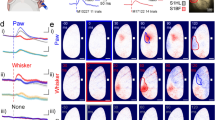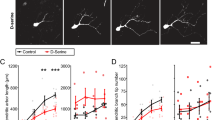Abstract
AN organised sequence of cellular events, some transient, others more lasting, occurs in the visual system on first exposure of dark-reared rats to the light. Hitherto these changes have been biochemically characterised only in terms of rates of change of precursor uptake into protein fractions or in vitro assayed enzyme activities. We have shown that, in the visual cortex, the onset of visual experience is accompanied by a modulation of the total functional quantities of two classes of macromolecule with reasonably well understood functions in the cellular economy. One is the colchicine-binding microtubular protein, tubulin1. We report here rapid transient changes in the amount of a protein known to be involved in synaptic functions, the muscarinic cholinergic receptor (mAChr), on the onset of light.
This is a preview of subscription content, access via your institution
Access options
Subscribe to this journal
Receive 51 print issues and online access
$199.00 per year
only $3.90 per issue
Buy this article
- Purchase on Springer Link
- Instant access to full article PDF
Prices may be subject to local taxes which are calculated during checkout
Similar content being viewed by others
References
Stewart, M. G. & Rose, S. P. R. J. Neurochem. (in the press).
Rose, S. P. R. Phil. Trans. R. Soc. Lond. B. 278, 307–318 (1977).
Richardson, K. & Rose, S. P. R. J. Neurochem. 21, 531–537 (1973).
Rose, S. P. R. & Sinha, A. K. Life Sci. 15, 223–230 (1974).
Rose, S. P. R. & Sinha, A. K. J. Neurochem. 27, 963–967 (1976).
Rose, S. P. R., Sinha, A. K. & Jones-Lecointe, A. FEBS Lett. 65, 135–139 (1976).
Sinha, A. K. & Rose, S. P. R. J. Neurochem. 27, 921–927 (1976).
Kuhar, M. J. & Yamamura, H. I. Brain Res. 110, 229–243 (1976).
Yamamura, H. I. & Snyder, S. H. Proc. natn. Acad. Sci. U.S.A. 71, 1725–1729 (1974).
Ellman, G. L., Courtney, K. D., Andres, V. & Featherstone, R. M. Biochem. Pharmac. 7, 88–95 (1961).
Lowry, D. H., Rosebrough, N. J., Farr, A. L. & Randall, R. J. J. biol. Chem. 193, 265–275 (1951).
Greenough, W. T. in Neural Mechanisms of Learning and Memory (eds Rosenweig, M. R. & Bennett, E.) 255–278 (MIT Press, Cambridge, Massachusetts, 1976).
Valverde, F. Brain Res. 33, 1–11 (1971).
Cragg, B. G. Nature 215, 251–253 (1967).
Gibbs, M. E., Jeffrey, P. L., Austin, L. & Mark, R. F. Pharmac. Biochem. Behav. 1, 693–701 (1973).
Author information
Authors and Affiliations
Rights and permissions
About this article
Cite this article
ROSE, S., STEWART, M. Transient increase in muscarinic acetylcholine receptor and acetylcholine sterase in visual cortex on first exposure of dark-reared rats to light. Nature 271, 169–170 (1978). https://doi.org/10.1038/271169a0
Received:
Accepted:
Issue Date:
DOI: https://doi.org/10.1038/271169a0
This article is cited by
-
Role of sound stimulation in reprogramming brain connectivity
Journal of Biosciences (2013)
-
Benzodiazepine receptor sites in the chick optic lobe: Development and pharmacological characterization
Neurochemical Research (1991)
-
Development of muscarinic cholinergic receptor binding in the visual system of monocularly deprived and dark reared rats
Neurochemical Research (1982)
-
Role of RNA and protein synthesis in memory formation
Neurochemical Research (1979)
Comments
By submitting a comment you agree to abide by our Terms and Community Guidelines. If you find something abusive or that does not comply with our terms or guidelines please flag it as inappropriate.



